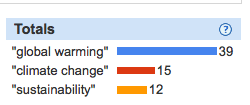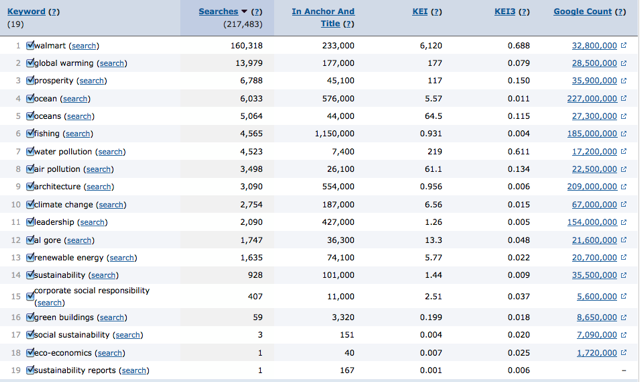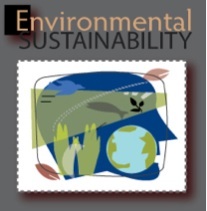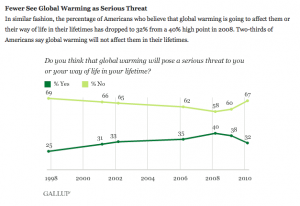This post is not about low interest on the part of our citizens searching on the Web for information about global warming, climate change, and sustainability, but low interest on the part of content producers towards Web search and how it is related to citizens searching, but not finding vital information on these and other sustainability-related issues.
Today’s New York Times article on Yahoo’s efforts to use search data to create search-generated content calls out a little known growth industry around the Web and highlights what every educator needs to know.
“Search-generated content has been growing on the Internet, as evidenced by the success of companies like Associated Content, which Yahoo recently bought, and Demand Media, which has used freelance writers to create an online library of more than a million instructional articles.”
Compare this to the old school educators and social activists who blanch at the phrase, content generation, and hold steady to the practices of print, and you will begin to understand why our citizens don’t get answers to their basic questions about global warming, climate change, sustainability or even about our oceans and water pollution.
It starts and ends with interest.
Yahoo and advertisers have a big interest in being in the top organic search results on key search terms because supplying relevant information when a person is in the buying cycle is a basic tenet of marketing success. Indeed, a recent article in DM News suggests Search Engine Optimization (part of what we are talking about) was once overlooked, but have realized it “doesn’t strain their budgets” and improved analytics make it “easy to understand the relationship between natural search rankings and revenue.”
Those in the business of education or those who would benefit the most from an informed public have shown very little interest.
The power of the Web has been highly commercialized largely because it is a buying machine. But it is also a learning and training machine, yet it just may be that to meet searchers needs is just too crass of a reason to create content that explains important concepts and issues and may interfere with the editorial and research freedom to publish what is important and what is not and to use language such as “eco-economics” and avoid prosperity in favor of ROI. Yahoo points out (you really need to read the NYTimes article) to its journalistic detractors: “The information is valuable because editors can integrate it into their decision making. It’s an asset. It’s a totally amazing and useful tool that we have at Yahoo. But it does not lead Yahoo editorial content.” A tool.
In other words, how can it not be crucial to understand that although there are 28M webpages out there on the subject of “global warming” less than 170,000 of them are titled to appear in top rankings (and thus be seen) to a search on the term, global warming, and even less on the question what is global warming? Yet there is significant search on this term, more on this term than on sustainability or climate change.
This chart (1) from Google Insights gives you a general idea of the popularity, if you will, of the three terms in relationship to each other. You can use the chart below to get some feel for search traffic on these terms which come from a snapshot (1%) of the search traffic over a years period of time using software called, WordTracker. For nearly every sustainability-related topic that I looked at, the search on “what is” or “definition of” was relatively high and the number of Web pages with a title that grabs was low. This is a great opportunity for organizations with a cause to gain traction with searchers out there who are entering or are in the learning cycle. In the hundreds of video programs we have reviewed for inclusion in our sustainability collection on EarthSayers.tv, the voices of sustainability, the titles reflect a general disconnect from what the video actually covers, choosing in some cases to emphasize the name of the person answering the question, what is sustainability, or the event at which the person attended and was recorded. These are just two examples of hundreds.
But first to change things, the educators and proponents of sustainability have to know and understand the capability of SEO and search engine marketing. Indeed, from my own experience, a greater interest in the Web would be a starting point for many of our leaders addressing environmental, social, cultural or economic sustainability, followed by increasing their (1) personal, (2) professional, (3) organizational, and (4) cause presence (brand) on the Web in all four categories, and take a crash course on SEO so they can better align their language and messaging with their objectives and audience. SEO by the way is complicated and is a learning experience for even the most seasoned of marketing professionals.
This is my agenda.
If you invite me to participate in a meeting around sustainability, this is what I am going to talk about; if you want me to increase your revenue for a sustainable product or service, this is what I am going to talk about and help you achieve; and if you ask me how to increase your membership, this is what I am going to talk about and make suggestions around. If you ask me about sustainability, I’ll probably refer you to one of the hundreds voices of sustainability found at EarthSayers.tv.
P.S. I included Walmart in the following chart to give an idea of corporate-related efforts to be in the top rankings, mostly using paid search, but increasingly using organic search more effectively.
Note: (1)
The numbers on the graph reflect how many searches have been done for a particular term, relative to the total number of searches done on Google over time. They don’t represent absolute search volume numbers, because the data is normalized and presented on a scale from 0-100




